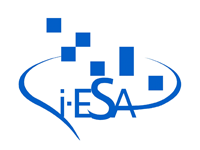Scope
The current economic environment requires for the companies to develop their capacity to interact and exchange information both internally and with external organisations (partners, suppliers, customers, citizens…) or, in other words, to develop their Enterprise Interoperability (EI). Since industry’s need for EI is one of the key drivers for research into the connected Digital Twins, I-ESA’24 aims to be an agora for the practitioners and researchers who wish to extend the theories, findings, best practices and business discourses on how to improve Enterprise Interoperability through Digital Twins.
The industry and academia will find at I-ESA’24 an outstanding opportunity to exchange experience and problems on business interoperability in their daily operations. The I-ESA conferences and workshops have been recognized as a tool to lead and generate an extensive research and industrial impact in the field of Interoperability for Enterprise Systems and Applications. I-ESA’24 brings together the world’s leading researchers and practitioners in the area of enterprise interoperability, and it is a unique forum for the exchange of visions, ideas, research results and industrial experiences, dealing with a wealth of interoperability research subjects.
Topics
Full and original scientific papers of high quality are invited to I-ESA’24. I-ESA’24 conference welcomes submissions of scientific papers directly connected with the Conference Topics indicated below, but also papers demonstrating industrial case studies in the context of digital and green transition, which address interoperability in relation to aspects of Industry 5.0 such as human-centricity, sustainability, and resilience.
The conference encourages submissions in (but not restricted to) the following areas:
Architectures and Frameworks for Enterprise Interoperability
- Agent based approaches to interoperability.
- Model Driven and Service Oriented (Enterprise) Architectures.
- Ubiquity, mobility, open architectures and large scale interoperability.
Artificial Intelligence for Enterprise Interoperability
- Automatic schema matching and intelligence.
- Autonomous agents.
- Robotic technologies for Enterprise Interoperability.
- Explainable, trustworthy and transparent AI with human-centric manufacturing.
- Generative AI and Large Language Models (LLM) for Enterprise Interoperability.
Collaborative Supply Networks for Enterprise Interoperability
- Dynamic Supply Chains.
- Interoperable Enterprise Architectures.
- Supply Chain Digital Twin.
Digital Platforms for Enterprise Interoperability
- Digital Manufacturing Platforms.
- Intelligent infrastructure and automated methods for business system integration.
- Open platforms supporting collaborative businesses.
Enterprise Interoperability through connected Digital Twins
- Digital Ecosystems.
- Digital Twin Model Driven Architectures.
- Digital Twin-Driven Designs.
Enterprise Interoperability Science-based
- Concepts, theories, and principles for solving EI problems.
- Contribution for EI Science-based from neighbouring scientific domains.
- Frameworks for the development of EI Science-based.
Enterprise Modelling for Enterprise Interoperability
- Meta-Modelling and synchronization of models.
- Requirements engineering for interoperable enterprises.
- Service Modelling for Business.
Industrial Implementation for Enterprise Interoperability
- Collaborative Workplaces.
- Enterprise Social Networks.
- Performance and knowledge management.
- Data management solutions for Enterprise Interoperability
Interoperability for Crisis Management (e.g. COVID 19)
- Early warning systems.
- Enterprise safety indicators.
- Organizational resilience.
Interoperability for Industry 4.0 and Digital transition
- Cognitive computing.
- Interoperability in lean manufacturing.
- Interoperability standards and requirements.
- Smart Manufacturing and Quality Control
Ontologies for Enterprise Interoperability
- Domain ontologies.
- Ontology driven integration.
- Ontology-Driven Semantic Interoperability.
Semantics for Enterprise Interoperability
- Enterprise applications analysis and semantic elicitation.
- Reasoning methods and tools for model transformation and data reconciliation.
- Semantic Web based approaches.
Services Innovation for Enterprise Interoperability
- Micro-services, negotiation and federated Interoperability.
- Service Science Management and Engineering.
- Utility and Value Added Services for Enterprise Interoperability.
Standardization for Enterprise Interoperability
- Challenges in standardisation and standardisation policies .
- Open Standards.
- Standards Organisations works on Enterprise Interoperability.
Green Deal and Sustainable growth in Manufacturing
- Circular Manufacturing
- Efficient reuse of materials and material modeling
- Product life-cycle extension practices
- Pollution prevention, detection, and control in land, waterways

